Filter News
Area of Research
- Advanced Manufacturing (22)
- Biology and Environment (25)
- Building Technologies (1)
- Clean Energy (82)
- Electricity and Smart Grid (1)
- Functional Materials for Energy (1)
- Fusion and Fission (6)
- Fusion Energy (1)
- Materials (27)
- Materials for Computing (6)
- National Security (3)
- Neutron Science (7)
- Nuclear Science and Technology (4)
- Supercomputing (38)
News Topics
- (-) 3-D Printing/Advanced Manufacturing (116)
- (-) Quantum Computing (31)
- (-) Simulation (45)
- Advanced Reactors (34)
- Artificial Intelligence (87)
- Big Data (50)
- Bioenergy (88)
- Biology (96)
- Biomedical (58)
- Biotechnology (21)
- Buildings (55)
- Chemical Sciences (60)
- Clean Water (29)
- Climate Change (94)
- Composites (25)
- Computer Science (184)
- Coronavirus (46)
- Critical Materials (24)
- Cybersecurity (35)
- Decarbonization (75)
- Education (4)
- Element Discovery (1)
- Emergency (2)
- Energy Storage (107)
- Environment (192)
- Exascale Computing (36)
- Fossil Energy (5)
- Frontier (41)
- Fusion (53)
- Grid (61)
- High-Performance Computing (83)
- Hydropower (11)
- Irradiation (3)
- Isotopes (49)
- ITER (7)
- Machine Learning (46)
- Materials (140)
- Materials Science (135)
- Mathematics (6)
- Mercury (12)
- Microelectronics (2)
- Microscopy (51)
- Molten Salt (8)
- Nanotechnology (60)
- National Security (59)
- Net Zero (12)
- Neutron Science (130)
- Nuclear Energy (105)
- Partnerships (40)
- Physics (59)
- Polymers (31)
- Quantum Science (66)
- Renewable Energy (2)
- Security (24)
- Software (1)
- Space Exploration (25)
- Statistics (3)
- Summit (57)
- Sustainable Energy (120)
- Transformational Challenge Reactor (7)
- Transportation (94)
Media Contacts
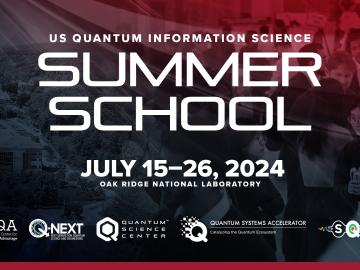
From July 15 to 26, 2024, the Department of Energy’s Oak Ridge National Laboratory will host the second U.S. Quantum Information Science, or QIS, Summer School.
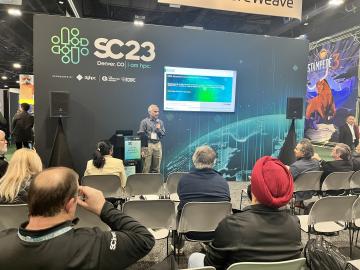
ORNL’s successes in QIS and its forward-looking strategy were recently recognized in the form of three funding awards that will help ensure the laboratory remains a leader in advancing quantum computers and networks.
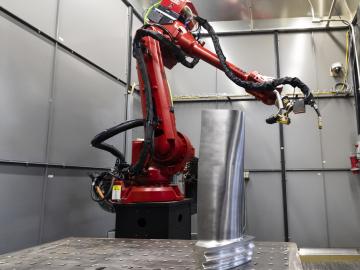
Researchers at ORNL became the first to 3D-print large rotating steam turbine blades for generating energy in power plants.
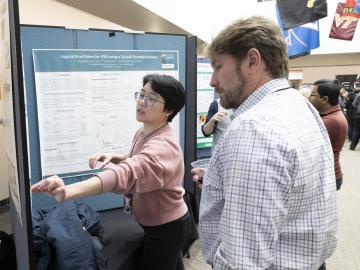
On Nov. 1, about 250 employees at Oak Ridge National Laboratory gathered in person and online for Quantum on the Quad, an event designed to collect input for a quantum roadmap currently in development. This document will guide the laboratory's efforts in quantum science and technology, including strategies for expanding its expertise to all facets of the field.
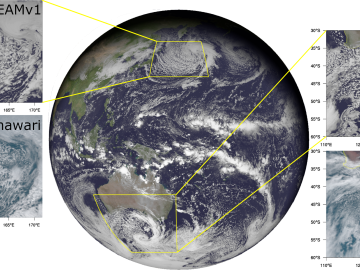
A 19-member team of scientists from across the national laboratory complex won the Association for Computing Machinery’s 2023 Gordon Bell Special Prize for Climate Modeling for developing a model that uses the world’s first exascale supercomputer to simulate decades’ worth of cloud formations.
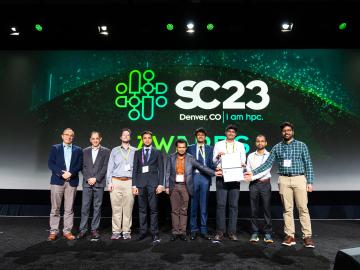
A team of eight scientists won the Association for Computing Machinery’s 2023 Gordon Bell Prize for their study that used the world’s first exascale supercomputer to run one of the largest simulations of an alloy ever and achieve near-quantum accuracy.
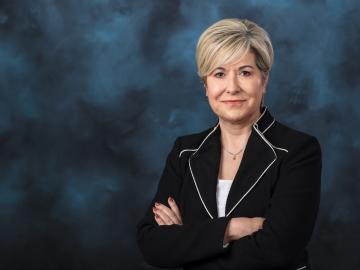
Effective Dec. 4, Gina Tourassi will assume responsibilities as associate laboratory director for the Computing and Computational Sciences Directorate at the Department of Energy’s Oak Ridge National Laboratory.
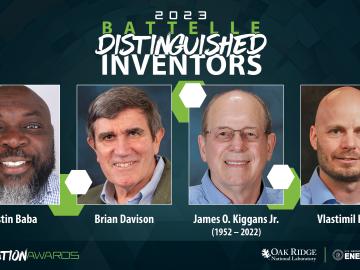
Four scientists affiliated with ORNL were named Battelle Distinguished Inventors during the lab’s annual Innovation Awards on Dec. 1 in recognition of being granted 14 or more United States patents.
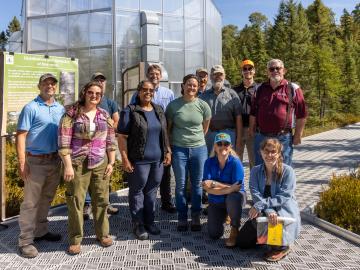
The first climate scientist to head the Department of Energy’s Office of Science, Dr. Asmeret Asefaw Berhe, recently visited two ORNL-led field research facilities in Minnesota and Alaska to witness how these critically important projects are informing our understanding of the future climate and its impact on communities.

Scientists at ORNL used their knowledge of complex ecosystem processes, energy systems, human dynamics, computational science and Earth-scale modeling to inform the nation’s latest National Climate Assessment, which draws attention to vulnerabilities and resilience opportunities in every region of the country.




